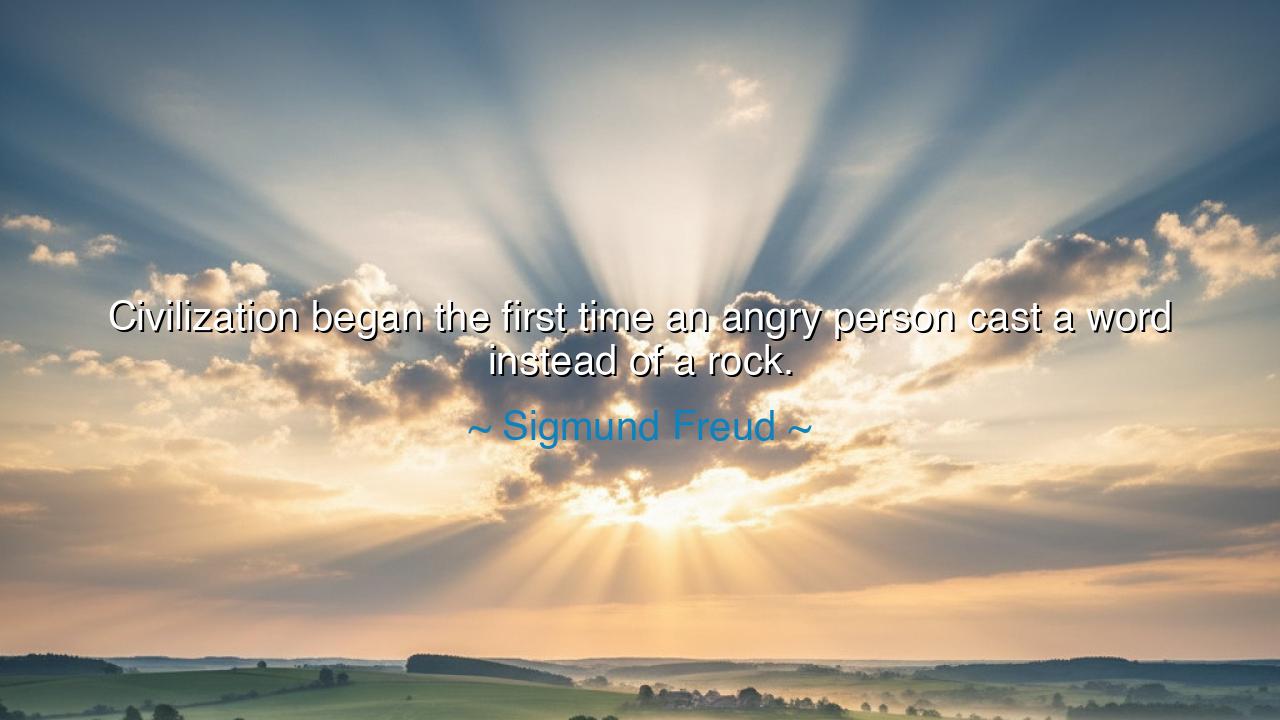
Civilization began the first time an angry person cast a word






The words of Sigmund Freud, “Civilization began the first time an angry person cast a word instead of a rock,” pierce into the very heart of what separates man from beast. In this single image lies the birth of society, the moment when violence was restrained and transformed into language, when destruction gave way to expression, and when chaos began to bend toward order. To replace the rock with the word is to exchange blind force for dialogue, vengeance for reason, and savagery for the beginning of human culture.
At its root, this quote speaks to the power of language as the foundation of civilization. For countless ages, conflict was resolved through blows, through blood, through the crushing of one life by another. Yet, when man discovered that his anger could be voiced rather than unleashed in violence, he opened the gates to law, to negotiation, to understanding. The word became the shield that protected life, and from this shield grew the possibility of cooperation, governance, and justice. Freud, a student of the inner life of man, knew that this transformation was not small—it was the very threshold that allowed humanity to ascend.
History gives us countless reflections of this truth. Consider the ancient Greeks, who once settled disputes through tribal combat and vengeance. But with the birth of the Athenian Assembly and the courts of law, citizens began to cast not spears but speeches, not rocks but arguments. Their debates, though fierce, were battles of persuasion rather than blood. From their words arose philosophy, democracy, and art—treasures that still guide us today. Here we see Freud’s insight: that when a man casts a word instead of a weapon, he plants the seed of civilization.
Another example lies in the story of Mahatma Gandhi. Confronted with the brutal might of an empire, he chose not the rock but the word—spoken through truth, nonviolence, and the relentless moral force of speech and writing. His adversaries wielded power, but Gandhi wielded the spirit, and his words shook an empire until it fell. Here again we witness the evolution Freud described: the civilized man rises above the instinct to strike, and instead channels his anger into words that can move mountains without shedding blood.
The deeper wisdom of this quote is not merely historical, but personal. Each of us stands daily at the same threshold: when anger rises, do we cast a rock, or do we cast a word? Do we choose destruction or communication? In every household, every workplace, every nation, the difference between ruin and growth often lies in this single choice. Words may wound, yes, but they also heal, explain, clarify, and transform. Rocks can only destroy. Thus, the choice of the word over the rock is the very essence of civilization itself.
To the seekers of wisdom, let this truth be etched into your hearts: the measure of a person is not whether anger arises, but how that anger is expressed. Civilization is not the absence of conflict—it is the mastery of conflict through words, through dialogue, through reason. Each time you restrain your hand and give voice instead to your thought, you stand in the tradition of all who built humanity from savagery to society.
The practical lesson is clear: cultivate the discipline of speech. When anger stirs, pause before action. Let your tongue become the channel of your heart, but let it be guided by reason and respect. Use words to defend truth, to confront injustice, to express pain, but never let anger turn to violence that only perpetuates destruction. In this way, you do more than preserve peace—you continue the ancient work of civilization itself.
Thus, let Freud’s words be passed down as an eternal reminder: civilization begins not in the monuments we build, but in the restraint we practice, in the words we choose over the weapons we wield. Every time a man or woman casts a word instead of a rock, they keep the flame of civilization alive. And it is by that flame, small but enduring, that humanity has walked from the caves into the light of history.






AAdministratorAdministrator
Welcome, honored guests. Please leave a comment, we will respond soon